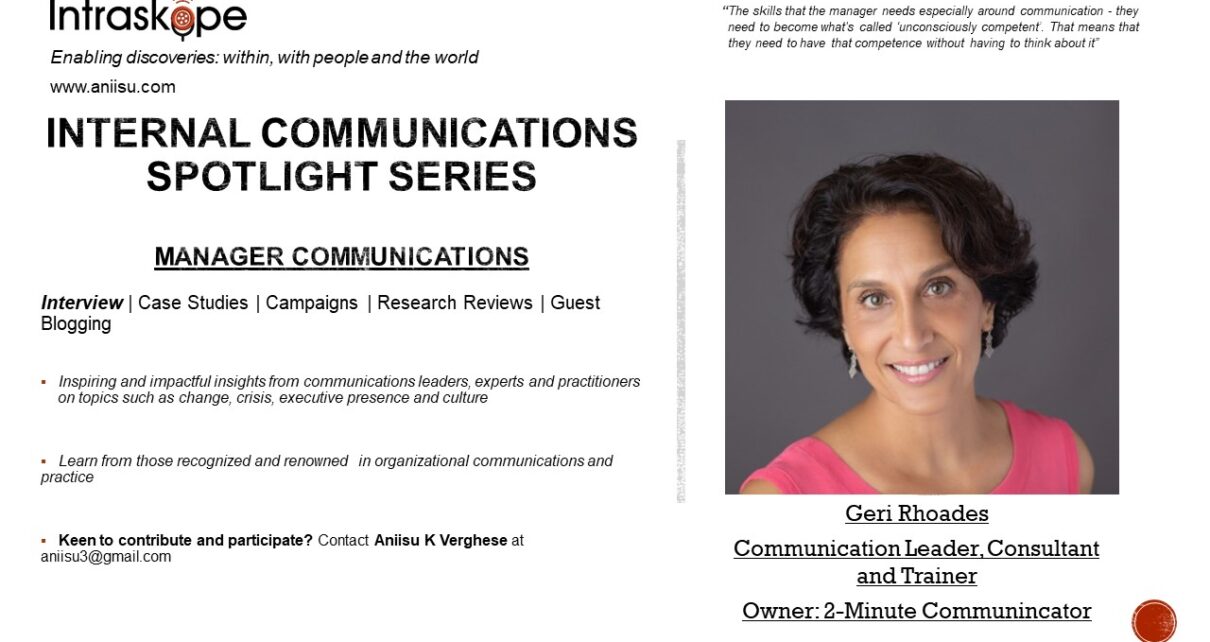Welcome to the 9th edition of Intraskope’s Spotlight Series featuring Geri Rhoades Ph.D., a communication leader, author and trainer.
For over 30 years in the communications industry, Geri has held numerous positions on both the corporate and consulting sides of the business and has built several internal and external communications organizations―including one of the first corporate change management departments in the United States. She holds a MA in Communication and an MBA. In addition, she has certifications in Executive Coaching, Reengineering and Change Management, Myers-Briggs Type Indicator, and Leading Virtual Classroom Instruction. Outside of work, she served as the former CTO of the Council of Communication Management and co-founder of Boston AIDS Africa; responsible for sending caregiver kits to those suffering from the effects of AIDS. She was named one of Boston’s heroes for this work. She is also the author of The Warrior and the Little Girl: Create Power and Joy in your Work Life.
How important is communicating to managers? What can be done to strengthen how managers communicate with their teams? How has the role of managers evolved over time? Learn more about this vital topic in this video featuring Geri Rhoades, a communications trainer, consultant and leader. I enjoyed this interaction and her insights will help communicators and organizations alike as they revisit their approach to manager communication and engagement. Watch this video and share your thoughts.
Geri is also running a survey among people managers. If you are leading a team, do take 10-minutes to find out your communication strengths. She promises you won’t be sold anything. You’ll be part of a global study. https://assessment.2minutecommunicator.com/assessments/managers
About Intraskope’s Spotlight Series
In this series I interview key thought leaders on topics interrelated with internal communications such as culture, crisis, change, executive presence and leadership. The goal is to help unravel why they matter, what can leaders and communicators learn from experts and how we can put insights to practice. Watch these short interviews and get better at understanding these key topics and how you engage with internal communications.
In this interview she explains the critical role played by managers and why communication by this group is crucial for the success of organizations. Geri discusses why it is more a skills issue rather than a ‘will’ concern when it comes to managers not communicating clearly and consistently. She believes that with support and coaching this gap can be closed.
“I noticed there’s been a lot of tension over the years between internal communicators and managers thinking internal communications needs to give the information to their people. And the truth is, they can’t. First the employees want to hear from the manager and second, the managers know their employees better than anybody. So, in terms of engaging them, they’re the ones that must do it,” says Geri
Interview
Introduction:
I’m Geri Rhodes, I live in North Carolina in the United States. I have been in the communication industry for many decades, and some of you may know me through my training that I did for Melcrum – the Black Belt training on internal communication and that was quite popular. Yes, throughout the world, so I might have trained some of you. And I’ve been on a variety of different sides of the business around internal communication in the last, say, I would say 15 or 20 years have focused on manager communication teaching managers how to communicate. I run an assessment called the two minute communicator, and it’s a series of two minute videos for managers or people managers if you will, at any level, and it deals with all the topics that they need so there’s over 100 videos, and I think about 15 series in six different categories diversity and inclusion, hiring and performance management, communication fundamentals, and what it is it’s an on demand library that a manager can go in when they’re having an issue, and it can get two minutes of coaching, in essence, it’s a coach in their ear, which is I think what many of them need around the area of internal communication, investing, that’s a great resource.
- How important is communications to managers and by managers?
Well, it’s extremely valuable and extremely necessary because there’s a lot at stake. Research shows that 90% of employees don’t think their managers are communicating enough and yet they’re 70% responsible for the variance in engagement. That means of engagement goes up or down based on this factor. Managers are 70% of the reason, that’s a huge responsibility we already know that engagement drives things like profitability productivity, effectiveness etc. So, there’s tremendous things at stake, and managers are not equipped with the skill to be able to handle what they need now more than ever, because we’re dealing with remote teams, which will sort of be hybrid teams and the stakes are even higher.
2. What according to you is the role of managers when it comes to communications?
Well you know I noticed there’s been a lot of tension over the years between internal communicators and managers thinking internal communications needs to give the information to their people. And the truth is, they can’t. First the employees want to hear from the manager and second of all the managers know their employees better than anybody. So, in terms of engaging them, they’re the ones that must do it. And I think I believe there’s also another debate whether it’s will or skills issue. Whether the managers are willing, or they don’t have the skills, I believe it’s skill. I think that they want to be good leaders they want people to follow them, they want to have the trust of their teams, they don’t know how to do it, they have been promoted for the most part because they were really good at their job, they must be trained to be managers that communication is the number one factor.
3. How do you see the role of managers evolving over the years?
I don’t think anybody is the center of the universe of anybody’s life, so of course they’re not the center of the universe, but they are the people that research shows that people want to hear from, and they’re the most credible source, you know the organizations have stepped up a bit in their research over COVID Because they have taken such an active role in communicating to the employees directly. So that’s a little, but it’s going to go back. Hopefully, you know, God willing, we don’t have COVID door or anything like COVID again for a long time it’ll go back to the managers needing to communicate to their people. That’s really a hard one, you know, the managers used to be you know, Are you here, are you here on time are you doing what you’re supposed to be doing you know they were record keepers. Their knowledge workers, you know managers have a big job. Nobody just managers, which is too bad, because if you were just managing just think, with the support that you could give for the folks that report to you. So, the role has changed it’s much more challenging, that means that the skills that the manager needs especially around communication, they need to become what’s called ‘unconsciously competent’. That means that they need to have that competence without having to think about it. They can get there and it will take some time. People are not born great communicators. They have to learn how to be good communicators over time and practice. So, their role has evolved. All although I’m hesitant to say that because in my world and your world, they have always had to be good communicators. So, it’s evolved to being more necessary. And the other thing that has evolved, I will say is the filtering of information it used to be, they weren’t good people weren’t getting enough information now it’s information overload. So, the manager needs to filter, some of that to really highlight what’s important, because there’s just too much data coming at people, way too much.
4. What can organizations do more to engage managers and empower them to get stronger with communications?
First of all they have to make it a priority, they have to acknowledge that it is important then the data shows that it is important, then they need to make it a priority so they need to do an analysis, what are they currently doing for managers and what’s working, what’s not, I know that a lot of communication teams put together, toolkits and they put them online and the managers can self-serve. And if you look at that, usage, I bet you it’s low, it’s too complicated, we need to make it easier for them. I totally get communications part of their role and this is an argument we have an internal communication with the managers hey it’s part of your role. Here’s some things that you can do, But they’re really busy so we have to really simplify what we’re doing for them which was actually the plan behind the two minute communication, let me give them some coaching in two minutes with something they can do immediately, you know, so you have to think about things that are very simple that they can act on, which is what a coach would do. And the other thing is constant support, and I think, build the trust because if a manager trusts you enough to call you up and say I’ve got this communication challenge, can you help me work through it, that’s golden.
5. What advice do you have for communicators as they construct programs and initiatives directed at managers?
Make it simple. Make it applicable to the work that they do and show them the benefit to the manager themselves. We all like to believe that no one is self-serving and everybody will do this for the good of the world. What’s in it for them is better productivity, nicer workplace, they’ll enjoy their work more, being a leader that people want to follow. I mean, don’t we all want to be a leader that that somebody wants to follow? Show them why it’s beneficial and also don’t overload them. Pick one thing that you want them to improve on or you want them to focus on. It’s like the ‘stop smoking’ message – although I’m not a smoker, my understanding is if you smoke on Monday and you quit cold turkey and Tuesday, it’s really hard. If you go very slowly if you get there, too, the bad analogy of ‘smoking is terrible’, but you know what I mean.
Watch the complete video interview on YouTube or read the transcript below.
Missed the earlier episodes? Watch them here: D. Mark Schumann (Culture), Peter Yorke (Executive Presence), Sia Papageorgiou (Leadership Communications), Dianne Chase (Strategic Storytelling), Gloria Walker (Communication Planning), Rebecca Sangster-Kelly (Stakeholder Management), Ray Walsh (Localizing Employee Communications) and Prof. Matt Tidwell (Reputation).
You can also look up the ongoing Intraskope’s Spotlight on Internal Communication Series featuring practitioners from around the globe sharing best practices and perspectives.
Liked the interview? Post your comments and share it with your network.
Keen to participate in the ongoing series on Personal Branding, Internal Communications or CSR Communications? Drop me a note at [email protected]
Here are Internal Communications resources you can use:
- Learn: Internal Communications Fundamentals Course on Thinkific or Udemy
- Internal Communications Series: https://forms.gle/KcqmPzLwq7NQi5Km6
- Chat with Aniisu – Internal Communications: https://www.instamojo.com/intraskope/connect-with-aniisu-60-minute-personalized-d/?ref=store
- Internal Communications workshops: https://bit.ly/2zdBRl1
You can also visit my website www.intraskope.com and You Tube channel to know more about my work.
#IC #managers #managercomms #engagement #trust #conversations #leadership #authenticity #internalcomms #communications #internalcommunications #leadership #covid19 #gerirhoades #intraskope

